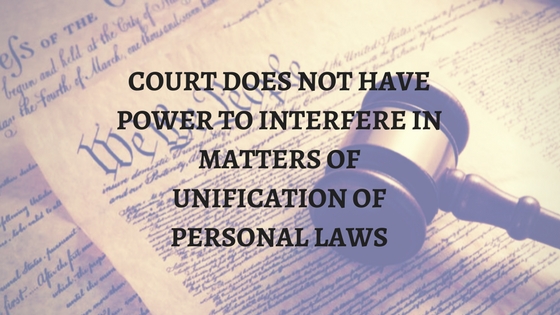Aapka Consultant Judgment Series- In this series, we are providing case analysis of Landmark Judgments of Hon’ble Supreme Court of India.
Ahmedabad Women Action Group (AWAG) & Ors. Vs. Union of India
AIR1997SC3614, (1997)3SCC573, [1997]2SCR389
Hon’ble Judges/Coram: Sujata V. Manohar, K. Venkataswami JJ.
Date of Decision: 24/02/1997
FACTS:-
A bunch of three Writ Petitions have been filed in this case in the form of Public Interest Litigations seeking to challenge various aspects of Personal Laws. The first writ petition sought to challenge the marriage, divorce and inheritance rules of Muslim personal law as violative of Article 14 and 15 read with Article 13 of the Constitution. Similarly, second petition sought to challenge some aspects of Hindu Marriage Act, 1955; Hindu Succession Act, 1956 and Hindu Guardianship laws on the touchstone of same provisions of the Constitution. That apart, the prayer sought in the third petition was to declare Sections 10 and 34 of Indian Divorce Act void and also to declare Sections 43 to 48 of Indian Succession Act void.
ISSUE:-
- Whether the Court should interfere in the matters of unification of Personal Laws or not?
Judgment:-
The Court at the very outset commented that these Writ Petitions do not deserve disposal on merits inasmuch as the arguments advanced before it wholly involves issues of State policies with which the Court will not ordinarily have any concern. Further, Court found that when similar attempts were made, of course by others, on earlier occasions this Court held that the remedy lies somewhere else and not by knocking at the doors of the courts.
The first question is whether it is necessary that the legislature should make law uniformly applicable to all religions or charitable or public institutions and endowments established or maintained by people professing all religions. In a pluralist society like India in which people have faith in their respective religions, beliefs or tenets propounded by different religions or their offshoots, the founding fathers, while making the Constitution, were confronted with problems to unify and integrate people of India professing different religious faiths, born in different castes, sex or Sub-sections in the society speaking different languages and dialects in different regions and provided a secular Constitution to integrate all sections of the society as a united Bharat. The directive principles of the Constitution themselves visualize diversity and attempted to foster uniformity among people of different faiths. A uniform law, though is might desirable, enactment thereof in one go perhaps may be counter-productive to unity and integrity of the nation. In a democracy governed by rule of law, gradual progressive change and order should be brought about. Making law or amendment to a law is a slow process and the legislature attempts to remedy where the need is felt most acute. It would, therefore, be inexpedient and incorrect to think that all laws have to be made uniformly applicable to all people in one go. The mischief or defect which is most acute can be remedied by process of law at stages.
In State of Bombay v. Narasu Appa Mali AIR1952Bom84, Chagla, C.J., while considering the validity of the Bombay Prevention of Hindu Bigamous Marriages Act, 1946, observed as follows: “a question has been raised as to whether it is for the Legislature to decide what constitutes social reform. It must not be forgotten that in the democracy the Legislature is constituted by the chosen representatives of the people. They are responsible for the welfare of the State and it is for them to lay down the policy that the State should pursue. Therefore, it is for them to determine what legislation to put up on the statute book in order to advance the welfare of the State”
Gajendragadkar J. also in his concurrent judgment expressed the opinion on the question whether Part III of the Constitution applies to personal laws. The learned Judge observed as follow:
“The Constitution of India itself recognises the existence of these personal laws in terms when it deals with the topic falling under personal law in item 5 in the Concurrent List-List III. This item deals with the topics of marriage and divorce; infants and minors; adoption: wills, intestacy, and succession; joint family and partition; all matters in respect of which parties in judicial proceedings were immediately before the commencement of this Constitution subject to their personal law. Thus it is competent either to the State or the Union Legislature to legislate on topics falling within the purview of the personal law and yet the expression “personal law” is not used in Article 13, because, in my opinion, the framers of the Constitution wanted to leave the personal laws outside the ambit of Part III of the Constitution. They must have been aware that these personal laws needed to be reformed in many material particulars and in fact they wanted to abolish these different personal laws and to evolve one common code. Yet they did not wish that the provisions of the personal laws should be challenged by reason of the fundamental rights guaranteed in Part III of the Constitution and so they did not intend to include these personal laws within the definition of the expression “laws in force.” Therefore, I agree with the learned Chief Justice in holding that the personal laws do not fall within Article 13(j) at all.”
Time and again this Court has given the opinion that while it was desirable to have a Uniform Civil Code, the time was yet not ripe and the issue should be entrusted to the Law Commission which may examine the same in consultation with the Minorities Commission.
HELD:-
Issues raised in this case are in nature of State Policy, and thus, the only legislature is empowered to deal with such issues.
To Get Legal Opinion from Advocates/ Legal Experts, Please click here
To Get Legal Opinion from Retired Hon’ble Judges, Please click here












